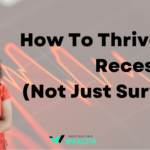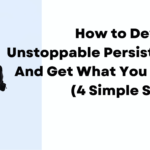
It’s been a rough few weeks for investors in the stock market and cryptocurrency, to put it mildly. I have some action steps to offer in this episode. Tune in for one of the stock picks I’m buying during the dip and other action steps to consider as we ride this one out.
Do you have a question you would like me to answer on the podcast? Follow me on IG: @indestructiblewealth and send a message, or visit me at www.myindestructiblewealth.com for more resources.
—
Table of Contents
Listen to the podcast here
Why The Markets Are Crashing, And What To Do Right Now
Welcome back to the show. I know that for those of you that are in the market, either the crypto or the stock market, you are concerned because it’s been a bloodbath. There has been incredible cartage in those two markets. I think this is great. I’m excited. My portfolios have dropped substantially. If you follow me, you know that I preach asset allocation and cashflow investing assets. I only had a pretty small percentage. Between stocks and crypto, I might have maybe 15% to 20% of my investible dollars. The rest of it is in cashflow-producing assets
Federal Reserve And Inflation
It’s been jaw-dropping, painful numbers. There has been a sea of red every day. I want to explain and set up why this is happening and then what you should potentially do about it. Most of this has to do with what’s happening with the Federal Reserve and inflation. The Fed printed a lot of money since 2020. 40% of all the money printed in US history has happened since March 2020. Why are they doing that? Why are they printing money? They started doing it back in 2008 to save the banks. The Federal Reserve started printing more money to give banks the liquidity or the cash that they needed to be able to stay in business. If they hadn’t stepped in and done that, we could have seen a widespread failure among banks, and that would’ve been a total collapse of the US economy. We were on the verge. It was close, but it didn’t happen.
Since that time, the US economy is addicted to federal stimulus. It’s like crack. When you’re a crack addict and your supplier threatens to cut off your supply, what are you going to do? You’re addicted to it, so you’re probably going to panic. That’s exactly what’s happening in America. We are addicted to the supply and endless money printing. We’re like crack addicts. When the Fed threatens to raise interest rates substantially, the mere threat of that is causing this panic. Investors are selling off what they consider riskier assets, which would be tech stocks and crypto. Even safe crypto assets have plummeted. Even safe stocks, which are strong blue chip stocks, have plummeted as well.
Will the Fed follow through and raise the interest rates at the rates which they have talked about or threatened to raise them? I would say, almost undoubtedly, the answer is no. They will not do that because they do not want to be known as the people aka the Federal Reserve team that crashed and collapsed the US economy. What they are trying to do is with their threats, they knew that the stock markets and the risk assets would drop. They’re utilizing that drop to help combat inflation.
The Fed’s only tool that they have is to either raise rates or threaten to raise rates. They realize that if they raise rates substantially, then we’re going to see a collapse of absolute, gigantic proportions. They simply don’t have the stomach to do that. What they’re trying to do is be able to get inflation, which is operating at high levels.
There are massive amounts of money printed. On top of that, we have incredible supply chain disruptions. We have a reduction in supply, which is causing an increase in prices across the board. That’s one main reason that assets are dropping like a rock. The reason I’m buying these assets that are on sale is that I don’t believe that the Fed is stupid. The Fed knows what they’re doing. This is their playbook. The key is to keep calm, be optimistic, and enjoy the move upward, which is going to happen towards the second half of 2022. It probably won’t start until at least July 2022, but maybe later in 2022. We will see a melt-up in asset prices once everybody realizes that the Fed was completely full of shit.

Markets Are Crashing: The Fed knows what they’re doing; this is their playbook. The key is to keep calling, be optimistic, and enjoy the move upwards, which will happen towards the year’s second half.
Over-Leveraging: Too Much Margin Buying
The other thing that’s happening in the crypto market that you should be aware of is what’s called over-leveraging. There are programs, and I’ve talked about them and urged you to use caution if you do use them, where you can borrow against your crypto. For example, there is Nexo and Celsius. Those are great platforms where if you want to raise cash or you want to get some cash back out to use for something else, you don’t have to sell your crypto in order to get that cash or that liquidity. You can borrow against it and pull that cash out.
As I explained in a previous episode, Nexo had me cashed out the next day. If you’re utilizing a lot of leverage and you’re utilizing more than I recommend, the problem is if the asset drops quickly, then the exchanges are going to do what’s called a margin call. What that means is that the price of the asset that you’ve borrowed has dropped too low versus the amount that you’ve borrowed out. It’s called a loan-to-value ratio. For example, if your crypto is at $100 and you pull out $65, that means you’re at a 65% loan-to-value ratio. If that crypto draws down to 65% or even 80%, then what the exchange is going to require from you to protect themselves so they don’t lose money is to buy more of that asset or to close out and pay off your loan.
If you’re the type of person that is a degenerate gambler that borrowed against your crypto, maxed it out as much as you could get where you maxed out 50% or 60%, or whatever the max was that the exchange allows you to do, and then took that and bought more crypto with it, that is stupid. You are an absolute degenerate gambler of the highest level when you do things that are this risky and speculative in nature. I hope none of you did this. You’re in for an absolute blood bath, because as your asset draws down, then they’re going to do a margin call. If you don’t have the cash, which you probably don’t, to be able to pay off the loan, then they’re going to liquidate the rest of your crypto in order to be able to pay off that loan. That means you’ll lose everything that you had in that when you get liquidated.
What happens when thousands of people across the board bought on margin with lending money, which is not their own real dollars but borrowed money, it’s almost like a domino effect where it keeps getting worse. When more people get liquidated, that creates additional downward selling pressure, which is going to cause a quick crash in prices as we’ve seen. Is there fear of the war between Russia and Ukraine? Yes. Is there a fear of supply chain disruptions? Yes, but the most impactful events that are causing these drops are what I’ve already said. The top two are the Fed and too much margin buying. This is causing an absolute cataclysmic drop.
Buy Great Assets And Hold On To Them
Here’s what I have to tell you. The key to building long-term sustainable wealth is to buy great assets and hold them for long periods of time. That’s typical with at least a five-year timeframe or sometimes forever. The key to building long-term sustainable wealth faster is to buy great assets at fantastic prices and hold them. Assets are on sale. They’re not just regular assets, but we’re talking about great assets. There are great companies that are gushing free cashflow and have amazing growth prospects over the next decade in hyper-growth industries that are 50% to 75% off. Some are even more.
The key to building long-term sustainable wealth is to buy great assets and hold them for long periods. Share on XIn this episode, I’m going to give you my number one favorite buy for stocks. I’m putting $20,000 or more into this single stock alone, which is pretty rare for me to go that big on one stock. You’ll want to hear about this particular stock. Think to yourself for those of you that were an investor or had some cash back in 2008. I know some of you were still in diapers. Some of you were in preschool or some of you were in high school and you didn’t care. All you cared about was what you were doing that weekend. You couldn’t wait to get out of class.
Let’s be honest. You were not in a position to be able to invest, but those that were, back in 2008, think back and remind yourself what you’d said to yourself many times since then. It’s, “Why didn’t I buy more stocks when they dropped so low?” We didn’t buy because we were scared, me included. Uncertainty was the major theme. Maybe you tried to time the bottom and then you missed it. It bounced right back. I did buy a little bit after the 2008 plummet, but not anything substantial.
This happened to me trying to time the bottom in the March 2020 COVID-induced selloff. The stock market dropped 30% in a very short period of time when the threat of COVID was starting to become real. I was locked and loaded and ready to fire away to buy great companies that weren’t going anywhere that were 50% off. For companies like Ford and Cisco, where are those companies going? They’ve lasted for 100 years. They’re gushing free cash. They were on sale half off. I knew the market was going to go a bit lower, so I waited, and then I missed it. The bottom hit and popped back up. I thought it was going to keep dropping.
Are we at the bottom? Honestly, probably not. We have a bit more room to drop. The NASDAQ is going to test the 11,200-a-day moving average. When it hits that, it probably will bottom out there. It may drop a bit below, but I don’t think it’s going to go too much below that. After the last enormous drops, I’ve been busy putting buy orders in. I’m buying incredible future-oriented companies that I’ve been researching for months.
I put a research report together that outlines fifteen stocks that are mispriced. They’re incredibly lower than what they should be valued at. What I’m getting are deals. They’re great companies at incredible prices that have awesome growth potential over the next decade. Do you want to get a copy of that report? You guys got to pay for this one. I give out so much free content here, but I got to draw the line when I spend $20,000 and multiple days to buy the research to then give to you.
This report will be released with my new book, Building Indestructible Wealth. It’s due to launch anytime. I’m just waiting for the final sales copy pages to be put up. I’m saying within the next week when you’re reading this. I’ll also share how I’m dollar-cost averaging and placing limit orders. You’ll want to do these same two things. If you follow my platform at all and tune in to any of my episodes, of which I have 70 five-star reviews out of 70, then you know it’s rare that I talk about or promote stocks. I’ve maybe done 4 or 5 episodes total.
I simply didn’t like the risk-reward ratio. Stocks were priced high compared to earnings. Some were even priced at 100 times annual sales. That’s insane. There was no surprise those stocks came crashing down extremely hard. It was harder than any other companies that we’ve seen. We can scoop up great companies that five years from now will be celebrating our courage that we bought into market weakness and sold eventually into market strength.
Stock Pick: Opendoor
I’m going to dive into my number one pick for a stock to buy on the dip. Have you ever sold a home before? If yes, then you know it’s probably one of the worst processes in the entire world. I’d honestly much rather go down to the DMV than try to sell a house. It takes forever. It is usually about three months to close a sale. It costs a lot. There are agent fees and staging and closing costs. Selling concession fees often take more than 10% of the home sale price. It’s overly complex with an average of 6 parties per 1 home sale. It’s terribly volatile. About 20% of potential transactions fall through due to inflexible timelines, financing delays, and buyer back-outs.
Selling a home is probably one of the single most inefficient retail processes in the entire world. Why is it so inefficient? The real estate market is still stuck in the Stone Age. If you remember, buying electronics used to be inefficient. You had to get in your car, drive down to Circuit City or Best Buy, buy through crowds of people, talk to a sales rep, sit in a checkout line, paper the item, and go back home. Along came Amazon. It’s a company that centralized, streamlined, and simplified the shopping process with a single eComm platform. Buying electronic items became as easy as opening an app, searching for the product, and tapping Buy. Amazon leapfrogged shopping into the digital era. In doing so, it dramatically improved the experience.
Selling a home is probably one of the single most inefficient retail processes in the entire world today. Share on XWayfair has done the same thing in the home goods sector. In fact, I saw a tab open on my computer from my wife on Wayfair. Carvana has done the same in the automobile world. Chewy is doing the same thing for pet care. Across all these platforms, the retail shopping processes are being modernized, digitized, and optimized for consumer convenience, except in the home shopping world where less than 0.1% of homes sold are sold online. The real estate market is trapped back in the absolute Stone Age, but it won’t be forever.
One of the single best stocks to buy for the entire 2020s may be Opendoor. For those of you that are unfamiliar, Opendoor is the world’s largest iBuyer. The company uses technology and data science to virtually buy homes from sellers. It then uses that same approach to sell those homes to prospective buyers. I love this business model. It’s genius because it dramatically improves the hated archaic home shopping model. Opendoor makes the experience cheaper, faster, easier, simpler, more convenient, and more reliable.
From a consumer advantage perspective, Opendoor is creating a superior way to buy and sell homes. It’s the future of home shopping. Think about this. It’s cheaper because they have a 5% flat transaction fee. It’s faster because they can accurately price a home in minutes and sellers can close the deal super fast. It’s easier because it allows us to sell our homes from our mobile phones with a few clicks. It’s simpler because you’re dealing between you, the seller, and the buyer in Opendoor. It’s more convenient because it allows you to choose your close dates and escrow periods, giving you the flexibility to move your own time. It’s more reliable because their offers are all cash. The transactions never fall through because Opendoor fails to qualify. It doesn’t happen. Once they give you an offer, it’s good.
This is why I think that this is an early-stage Amazon of houses. I’m not concerned at all about profits. Opendoor has positive gross and earnings margins. The company is still in the very early days of its growth. It takes a 5% commission on every transaction and also earns money on the home price appreciation through its incredible algorithm that helps it to buy smart. Even in a down market, Opendoor has enough cash, over 2.5 billion worth, to weather some near-term turbulence.
It’s also worth mentioning that the housing market has a very strong upward growth trending bias. It tends to go up. About once a decade, it does go down. When it does, the downturn tends to be short-lived. They also take a long time to play out. Opendoor won’t be holding the bag because they move most of their products off their books in 90 days. A bad housing market will not stop Opendoor. Lastly, the team is incredible. More than 30 of the company’s employees hail from Amazon, 30 from Alphabet, 20 from Apple, 20 from Facebook, 6 from Square, 12 from Microsoft, and 12 from Twitter. These are incredibly smart engineers, data scientists, and execs of the world’s biggest and most successful tech companies. This team is second to none.
This company is building the future of the real estate market with a genius business model that should produce enormous profits at scale. Long-term, this could be a $100-plus billion company with conservative modeling of 5% market share and 28 times exit or price-to-earnings multiple. You have the opportunity to buy a future $100-plus billion company for less than $5 billion. It’s worth 5 billion, but it’s going to go to $100-plus billion. That’s 20X. That’s a 20X growth from where we’re at.
How do you protect yourself from buying into a crazy bear market that keeps dropping? Number one, use a limit order. This is a way to put in the maximum price you’ll pay for the stock. If you use a market order, you’re always going to pay the highest price. Let’s look at Opendoor. As I record, it’s trading for $5.28. It’s already dropped 12%. I’d put in a limit order for $5 and see if there’s a seller that wants to sell to you for $5. If you put in market price, you’re going to pay $5.30 to $5.40 per share probably or almost certainly. If the stock doesn’t fall further and there are no willing sellers at $5, then it will expire at the end of the trading day. You can set it to be good until canceled, which means they’ll be an offer on the table that won’t go away unless you cancel it yourself.
I like Fidelity. For those of you that don’t have an online trading account that you have open to be able to trade stocks, it’s much better than Robinhood. It has a lot more options. Especially to be able to do options is a great way to play the stock market with a cashflow type of situation. I did an episode on options a few episodes ago. If you want to learn how to create cashflow from the stock market which could help lower your risk, then that’s an awesome episode for you to read.
The other play I recommend is dollar-cost averaging. This is essential in a market with downward momentum. This is where you’re saying to yourself, “I’m going to commit $5,000, $1,000, or $500 to buy this stock, but I’m going to break it up into multiple purchases. If the stock should continue to drop after I purchase it, I’m going to continue buying at lower prices, which will lower my average cost per share.” We do this because we can’t time the bottom of the market. It protects us should we buy and then it drops further.
For example, if I buy with half of my funds at a price of $5.25 and Opendoor falls to $4.25, then if I buy the other half to be all-in with my total of $5,000, I own the stock at an average price of $4.75. That lower price helps protect my downside. When the market recovers, I’ll be that much more in profit. It could backfire. The stock goes up from here. You’re buying it at a more expensive price as you dollar-cost average. That’s the chance that you have got to take. It’s especially worth it when we keep seeing a sea of red. It’s a good time to do a dollar-cost averaging.

Markets Are Crashing: It’s worth it when we keep seeing a sea of red. It’s a good time to do a dollar cost aver-aging.
Do you have any questions on this? Fire away. I hope this helps you. I’m buying carefully, but I’m buying great companies at incredible discounts. If you want my report with all my crypto picks and all my stock picks, I’ve done incredible amounts of days of research. I’ve been combing through reports, looking at what everybody’s saying and what they are agreeing on. You’re going to be able to get these two reports. They’re going to be $30 each. You can add them to your cart when you buy my book. They’re going to give you a great starting point to work on to be able to buy smart when you’re buying into this dip.
At the end of the day, you got to buy it, set it, and forget it. Don’t stare at your accounts. It could get uglier. I know it. It’s very possible. Trying to time the bottom is a fool’s game. Don’t try to do it. Zoom out. Where are these assets going to be in 5 years or 10 years? They’re going to recover. Things are going to march on. The economy’s going to move on. Inflation’s going to get under control. We’re going to be back in 5 years or 10 years. These things are going to be up substantially.
I get it. In the short-term, it could be scary and painful, but these are the times when we act with courage. The most amount of wealth is made when you buy in down markets. You make your money when you buy, not when you sell. These are my thoughts. I hope this helps. Hit me up with any questions. We’ll talk soon.





